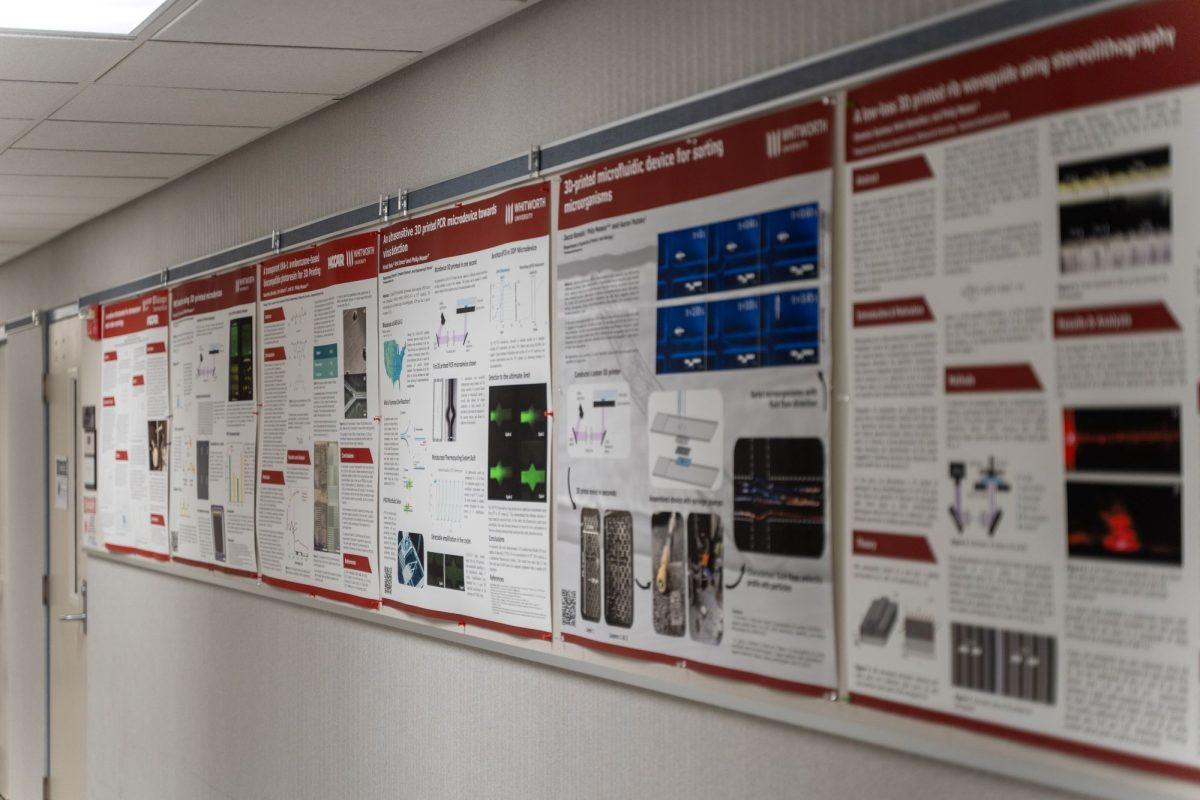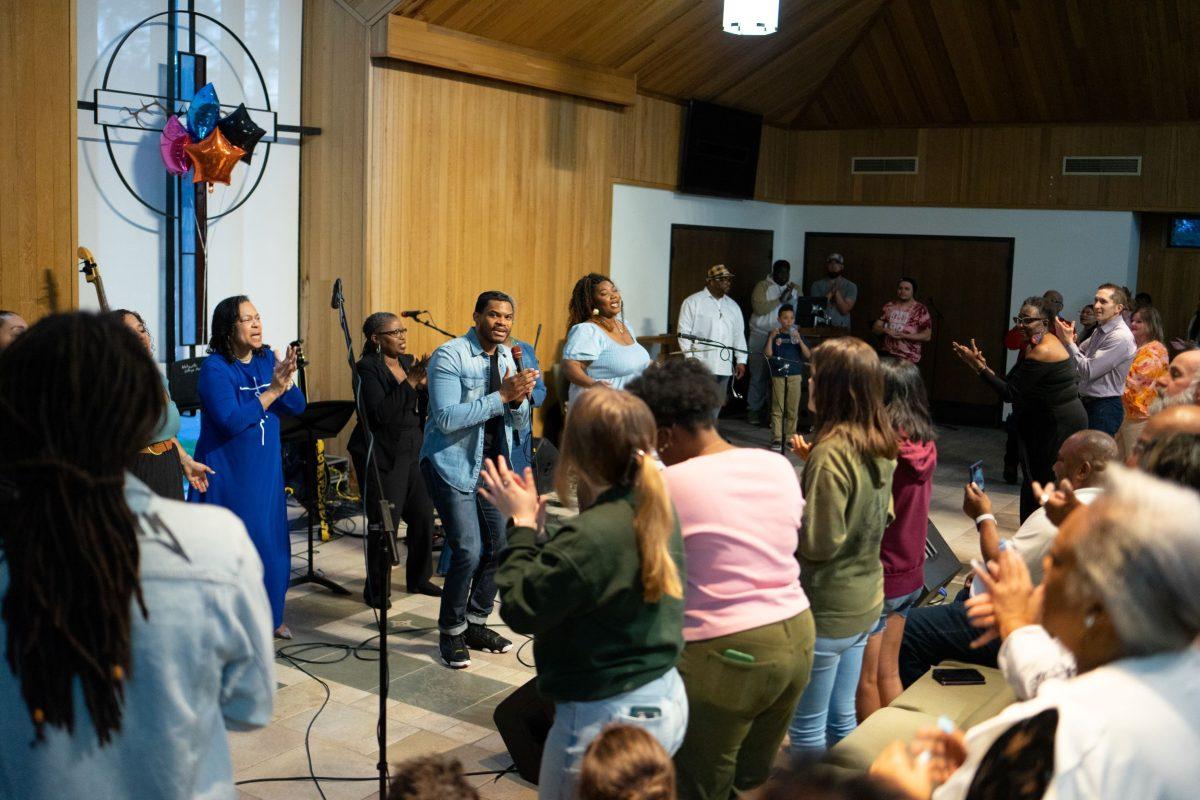Women’s leadership is a topic that has long been debated by the Christian church. Different denominations have different ways of approaching the subject, and often disagree even among themselves, said women’s and gender studies professor Pamela Parker.
“Almost every denomination has ended up having splintering over this issue,” Parker said.
Different branches of the Anglican church have divided opinions on women’s ordination. Episcopal Church in the USA affirms women in leadership, while the Anglican Catholic Church does not affirm women holding positions as bishops, priests and deacons, according to cbeinternational.org.
Senior Abbey Cook said she was discouraged from her career path at Whitworth’s Women in Ministry panel this past March. Cook, who said she hopes to teach faith and politics at the university level, said that many panel participants told her she shouldn’t.
“I was told by three people that I ought to reevaluate that call,” Cook said. “I’ve never been outright told ‘No, you are sinning by doing this.’”
Cook said the incident was upsetting, but pushed her to establish Whitworth’s chapter of X2, a club that seeks to address issues of women’s equality. Cook said the club, which was chartered last month, has three main focuses: education, mentorship and advocacy.
The mentorship aspect of the group is still in development, Cook said, but the goal is to pair female Whitworth upperclassmen with professional women in the same field, and underclassmen with junior and senior women in the same area of study, as mentors. She said that women are less likely to go into careers where they see no female role models.
“It is often more difficult for women to find mentors,” Cook said. “We think it’s important that they have women to look up to.”
Mentorship, as well as education and advocacy, is also important for women on campus because of the low levels of confidence Whitworth women have reported, Cook said. She said the most recent NSSE statistics report dramatically lower numbers of women feeling intellectually and socially confident than Whitworth men. Next year, X2 will work on developing and implementing the mentorship program, and bringing awareness to issues of gender disparity within and beyond the Whitworth campus.
Jennifer Brown, head of Women and Gender studies at Whitworth, said there will be another panel on campus next year comprised mainly of women in ministry roles. The idea is not to have a debate, Brown said, but to get women’s voices heard.
Parker said there are “sticky passages” in the Bible that elicit disagreement between Christians.
One such passage is from 1 Tim. 2:12-13: “But I do not allow a woman to teach or exercise authority over a man, but to remain quiet, (13) For it was Adam who was first created, and then Eve.”
Parker said that this passage and others should be examined from a broader cultural perspective, which takes into consideration the relationships of that society.
English professor Thomas Caraway, like Parker, said that cultural context of the texts should be thoroughly examined. He added he believes that changes in our interpretation of scripture are the result of cultural changes.
He said he believes that some Christians, particularly in the Protestant and Evangelical traditions, often pick and choose which Bible passages to obey, depending on the community.
“We selectively interpret it to the way we want it to be,” Caraway said. “So where do you draw the line?”
Caraway attends a non-denominational church in Spokane where women are not allowed to be elders. He believes using Bible passages to explain the exclusion of women from leadership fails to address the real issue at hand, he said.
“It seems more like apologetics for implicitly sexist attitudes,” Caraway said.
He said that applying universal significance to the material in Paul’s letters is overly legalistic.
“I think that beyond the direct words, parables and actions of Jesus, we have to be really careful about saying this is the only way something can be done,” Caraway said. “It’s only Jesus whose motivations can’t be questioned.”
Liv Larson-Andrews has been the pastor of Salem Lutheran Church in Spokane for nearly three years. She said she has not faced a lot of direct opposition in her church – a branch of the Episcopal Lutheran Church of America – which has been ordaining women for more than 40 years. She said Christians are often not in dialogue with one another on disagreements.
“More and more it seems like there are circles of the church that just don’t touch,” Larson-Andrews said.
She said in her personal experience she had the full support of her congregation, who have allowed her to integrate her roles as both pastor and mother. However, some women are encouraged not to go into ministry at all.
“I find myself having conversations with other young women who are told by their mentors to think about youth ministry, think about teaching, think about some other sort of social assistance ministry, but don’t think about being a pastor, because that’s not okay,” Larson-Andrews said.
Theology professor James Edwards said that scripture is not clear on the ordination of women because ordination as it is today did not exist in the New Testament church. He said there remains a plausible argument for women’s ordination, due to the treatment of women as leaders in the New Testament.
“The same Paul that made that command of Timothy [in 1 Tim. 2:12], evidently works with women in more or less ministry roles,” Edwards said, citing Priscilla and Phoebe as examples.
Edwards affirms the inclusion of women in ministry, but maintains that there is no concrete scriptural clarity. However unclear, he said he believes the topic does not need to be as divisive as it is today.
“I think given the fact that the exact role of women in ministry is not clearly defined, Christians need to be tolerant of those who disagree with one another on this issue without breaking fellowship,” Edwards said.
The Roman Catholic church stands in opposition to the ordination of women, arguing that their belief is based on Jesus’ own practices and not on cultural or personal ideals.
Reverend Christopher J. Coyne, in an article published on catholic.org, wrote that the church does not have a right to decide who to ordain. Rather, the church is bound to following Christ in his practices.
“In accepting and handing on [ordination] , the Church is bound by fidelity to the example of Christ to reserve ordination to males who have legitimately received this call from God and who are accepted by the Church as having received this call,” Coyne wrote.
Senior Josh Trevathan studies theology at Whitworth, and is getting his certification for ministry. He said he believes that, while women hold the same worth as men, God has designated them for different positions.
“In complementarian tradition, we acknowledge that certain duties and roles are designed for [women], and men have other roles. However, their dignity and value is the same,” Trevathan said. “My opinion is biblically centered, in that I believe men and women are different.”
Trevathan said that Christians who reinterpret parts of the Bible, often do so to accommodate their personal moral beliefs, and doing so ignores the objective realities of right and wrong.
“Because society has a different opinion, we’ve decided to try to mold the Bible to it, and that’s very dangerous.”
Larson-Andrews said the Bible forbidding the practice of women teaching and leading is not so matter-of-fact.
“The thing that gets to me is when people say ‘scripture is clear,’ if anything, it’s unclear,” Larson-Andrews said. “It’s a diversity of voices, and that’s one of the things that’s wonderful about the Bible.”
However, Larson-Andrews said she believes there is scriptural support of women holding pastoral positions and other positions of leadership.
“We read scripture alongside the movement and speaking of the Holy Spirit today,” Larson-Andrews said. “If women are experiencing the Holy Spirit calling them, I think we have scriptural precedence to listen.”
Contact Katherine Knoll at [email protected]





